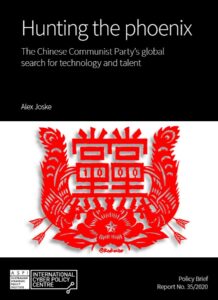The United States and China are pursuing a “great power” competition for global influence in an era of a more inward-looking Washington and an increasingly assertive and ambitious China. The power struggle is intensifying on multiple fronts and is seen by some an an emerging “cold war” akin to the mostly non-shooting conflict that played out between the United States and the former Soviet Union until the collapse of Soviet communism in 1991.
 US-China competition will be profoundly affected by global technology competition and how emerging technologies affect the future of economic development, Nobel Prize-winning economist Michael Spence tells Brookings’ Dollar & Sense podcast.
US-China competition will be profoundly affected by global technology competition and how emerging technologies affect the future of economic development, Nobel Prize-winning economist Michael Spence tells Brookings’ Dollar & Sense podcast.
The CCP views technological development as fundamental to its ambitions, argues analyst Alex Joske. Its goal isn’t to achieve parity with other countries, but dominance and primacy, he writes in Hunting the Phoenix: The Chinese Communist Party’s global search for technology and talent, a report for ASPI’s International Cyber Policy Centre (ICPC):
In 2018, General Secretary Xi Jinping urged the country’s scientists and engineers to ‘actively seize the commanding heights of technological competition and future development’. The Made in China 2025 industrial plan drew attention to the party’s long-held aspiration for self-sufficiency and indigenous innovation in core industries, in contrast to the more open and collaborative approach to science practised by democratic nations.
Joske writes that the TTP is overseen by the CCP’s “Overseas High-level Talent Recruitment Work Group,” the members of which represent at least sixteen government agencies, adds NAS analyst John David. In other words, China is all in on “talent-recruitment” (read: espionage, intellectual property theft, and propaganda) and has invested untold amounts of money and manpower to ensure its success. So far, this strategy has worked wonders for the CCP. Indeed, “According to official statistics, China’s talent-recruitment programs drew in almost 60,000 overseas professionals between 2008 and 2016.”
China is also working to turn a vital but esoteric tool of international cooperation into a mechanism to secure the Chinese Communist Party’s future, and the United States should have a plan to respond, argue analysts William Morrissey and John Givens.
China Standards 2035, expected to be issued later this year, is an aggressive strategy to make China a leader in international standardization. Leveraging its state-supported economic model, manufacturing prowess, and centrally led standardization system, Beijing is attempting to become the leader of global technical and commercial development to further expand its global political power, they write for War on the Rocks.
PUBLICATION ALERT
Read @ASPI_ICPC‘s latest report ‘Hunting the phoenix: The Chinese Communist Party’s global search for technology and talent’ now! Author @alexjoske details the methods & global scale of
’s talent recruitment programs
: https://t.co/h9sslmfe7l pic.twitter.com/Yx8G4e7O1p
— ASPI (@ASPI_org) August 20, 2020







